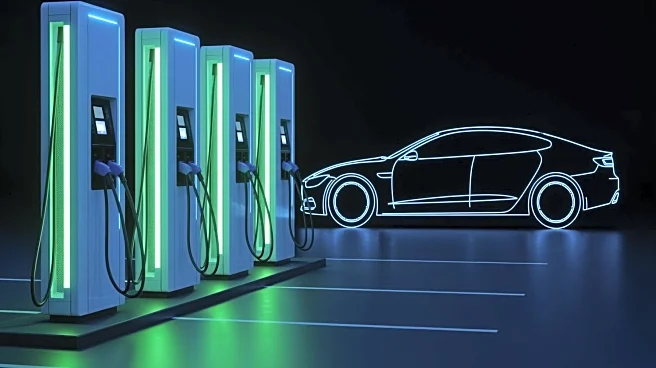What's Happening?
Sales of all-electric vehicles in the United States have seen a significant decline following the cessation of federal incentives that provided up to $7,500 for EV purchases. Ford Motor, Kia, and Hyundai
Motor have reported substantial drops in their EV sales for October. Ford, which was ranked third in U.S. EV sales through the third quarter, experienced a 25% decrease in year-over-year all-electric sales, including a 12% drop in Mustang Mach-E crossover sales and a 17% fall for the F-150 Lightning. Kia and Hyundai reported even steeper declines, with some models like Hyundai's Ioniq 5 and Ioniq 9 experiencing drops of 80% and 71% from September to October, respectively. The end of these incentives, which were altered under the Trump administration, has led to a market adjustment as buyers had previously accelerated purchases to take advantage of the credits.
Why It's Important?
The decline in EV sales following the end of federal incentives highlights the significant impact that government policies can have on consumer behavior and market dynamics. The incentives had previously driven a surge in EV purchases, contributing to record sales in the third quarter. With the incentives now removed, the market is expected to stabilize, potentially slowing the transition to electric vehicles in the U.S. This shift could affect automakers' strategies, as they may need to adjust pricing or offer new incentives to maintain sales momentum. The situation also underscores the importance of policy in promoting sustainable technologies and could influence future legislative decisions regarding environmental and energy policies.
What's Next?
As the market adjusts to the absence of federal incentives, automakers may explore alternative strategies to stimulate EV sales. This could include introducing new models, enhancing vehicle features, or offering manufacturer-specific incentives. Additionally, the decline in EV sales may prompt discussions among policymakers about the need for renewed or revised incentives to support the transition to electric vehicles. The automotive industry will be closely monitoring consumer responses and market trends to adapt their approaches accordingly.










